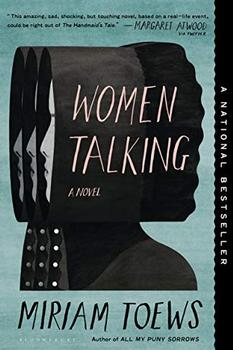Summary | Excerpt | Reading Guide | Reviews | Beyond the Book | Read-Alikes | Genres & Themes | Author Bio

This article relates to Women Talking
Miriam Toews' novel Women Talking is inspired by events that took place in Manitoba Colony, a Mennonite community in eastern Bolivia with a population of about 2,000. From 2005-2009, hundreds of girls and women were drugged and raped during the night, which religious leadership claimed was the work of God or the devil, punishing them for their sins. In reality, a group of eight men from the community were using an anesthetic made for cattle on the women and attacking them while they were unconscious, night after night, often assaulting multiple women in a single home before moving on. In 2011, these eight men, ranging from ages 20 to 48 were convicted of sexual assault; seven of them were sentenced to 25 years, and the eighth, deemed an accessory, was sentenced to 12 years.
Mennonites are a Protestant group that originated in Europe in the 16th century. In the 19th century many groups emigrated to the Americas after facing religious persecution. (The Manitoba Colony is named after the Canadian province where the colony's founders came from.) Traditionally, like the Amish, Mennonites eschewed modern conveniences such as electricity and cars in favor of a simpler life, and followed a patriarchal version of Christianity (although few groups are as rigid in their beliefs today).
This is particularly relevant to the situation in Bolivia because of the nature of the crimes. Upon first complaining of the attacks in the night, the victims were not believed, and were offered ridiculous explanations instead of a full-scale investigation. Furthermore, traditionally, Mennonite women are expected to be virgins before marriage, and many of the women felt they have been tainted by the assaults.They had been taught to believe entirely in the teachings of the (male) religious leadership, and in the years that followed, they have largely been expected to maintain silence because, as one leader asserted in an interview, "That's all behind us now...We'd rather forget than have it be at the forefront of our minds."
But things are changing. Miriam Toews herself is a Mennonite, and declares Women Talking her attempt to speak truth to power. In an interview with Now Toronto, she explains, "My anger toward my Mennonite community and my love for it go hand in hand...I've seen first-hand the harm done by fundamentalism, how the male elders are using the arbitrary rules that they've extrapolated from scripture to maintain control." Toews hopes to point out the flaws and injustices within the Mennonite community because she believes her brethren can and should do better. Toews' 2017 novel, A Complicated Kindness, is about a young woman yearning for freedom while attempting to conform to the cultural and religious expectations of her Mennonite community.
Toews is not alone in addressing this issue. The office of Women in Leadership for the Mennonite Church held a conference on "dismantling the patriarchy" within the organization in June 2018. The conference was aimed at teaching individuals in leadership positions about "intersectional oppression" and "imagining a new way of living and being in the world." The group offered further classes on the subject in Spring 2019.
The conversation in Women Talking revolves around a literal exodus from a patriarchal institution, but it also operates as a sustained metaphor for standing up and protesting misogynist oppression wherever it might be found.
This article has been edited to address issues relating to the Mennonite church in the modern day.
Filed under Places, Cultures & Identities
![]() This "beyond the book article" relates to Women Talking. It originally ran in April 2019 and has been updated for the
March 2020 paperback edition.
Go to magazine.
This "beyond the book article" relates to Women Talking. It originally ran in April 2019 and has been updated for the
March 2020 paperback edition.
Go to magazine.
Your guide toexceptional books
BookBrowse seeks out and recommends the best in contemporary fiction and nonfiction—books that not only engage and entertain but also deepen our understanding of ourselves and the world around us.